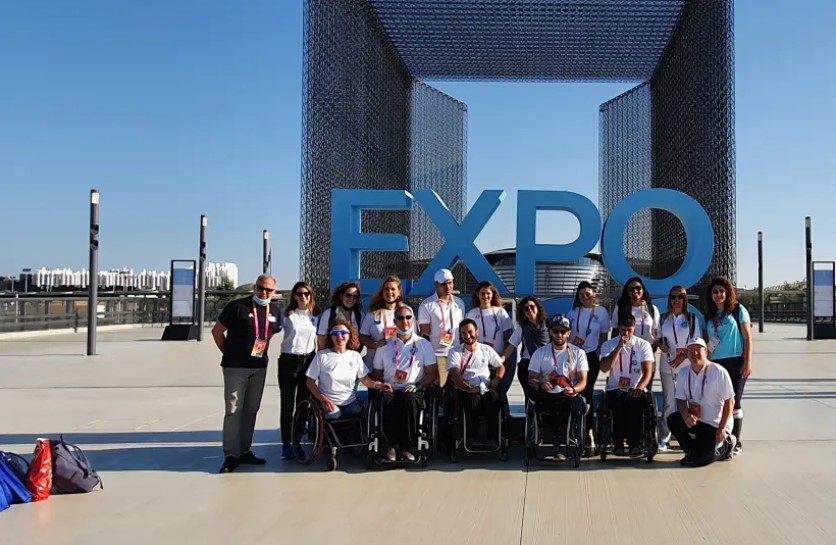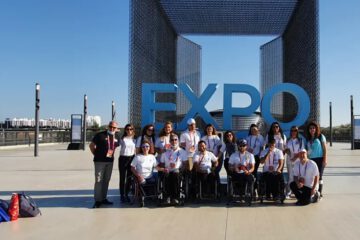The Israeli pavilion at the Expo 2020 offers the experience of being a disabled person in an urban environment.
By: HOWARD BLAS / The Jerusalem Post

Access Israel is well known in Israel for its disability awareness work and advocacy efforts on behalf of people with disabilities.
Last week, a delegation of leaders from Access Israel took their message and their “urban obstacle course” on the road to Dubai. Visitors to the Israel pavilion at Expo 2020 Dubai had an opportunity to experience what it is like to navigate an urban environment in a wheelchair or as a blind or visually impaired person.
Access Israel, an NGO established in Israel in 1999, also marked December 3 the International Day of “People of Determination” at its pavilion, along with colleagues from Keren Kayemeth LeIsrael-Jewish National Fund (KKL-JNF), Start-Up Nation Central, and the Regional Cooperation Ministry.
The organizations also showcased advanced accessibility technologies, including an automatic speech recognition device developed by Voiceitt; medical technology and innovative communication technologies produced by EyeControl, an AI-based motion-control system that analyses wheelchair seating positions developed by ReSymmetry; and a panoramic, 3D photography system that identifies accessibility obstacles in a range of terrains, including urban environments.
According to most estimates, people with disabilities comprise 15% of the world’s population.

“The Israeli innovation ecosystem offers multiple technological solutions to a global challenge, with the hope of enhancing the lives of people with disabilities and achieving a more precise lateral integration,” said Michal Seror, director of ecosystem development at Start-Up Nation Central. “Start-Up Nation Central regards the display of the Israeli technology in Dubai as a direct continuation of our long-term partnership with the UAE.”
KKL-JNF, Access Israel, Start-Up Nation Central, the Regional Cooperation Ministry, Google and FAISR also created a collaborative social event to increase awareness. One hundred people with and without disabilities jointly created the logo of the International Disability Alliance on the Expo lawn by holding up blue umbrellas.
Michal Rimon, CEO of Access Israel, found the making of the umbrella campaign video, which required 100 people to stand in the Dubai heat with an umbrella raised, to be one of the most touching and memorable moments of their stay in Dubai.
“I was afraid it would be difficult to get so many people to agree to be part of it. Eventually, we had hundreds of participants – those who did not have an umbrella cheered and clapped and the entire hour became a real attraction – bringing together people from all over the world on this special date and raising awareness for us all.”
Rimon welcomed the opportunity for Israel to actively participate in this important world event.
“The Expo is one of the largest global exhibitions and a great opportunity to send our message and share our projects with people literally from all over the world. We had a chance to get together with people from all our neighboring countries as well as from other parts of the world. Israel’s leadership in inclusion and disability was evident, and people want to learn more.”
Access Israel founder and wheelchair user Yuval Wagner added, “Arriving at UAE on an official delegation of Israel with an amazing unique combination of people with and without disabilities, wearing the Israeli flag with pride and receiving great reactions from the people themselves, was an amazing experience and true pride for us all.”
Wagner looks forward to returning soon.
“The fact that we left with a specific request from several local contacts – that they want more and want us back already in January – is probably the best proof to the potential and the ripple effect of our visit.”
The Access Israel delegation had planned to organize an accessible candle-lighting event on December 5 in Dubai, utilizing a menorah developed by Impact Labs and printed on a 3D printer. The menorah makes it possible for people with arm and hand disabilities to light candles using a special lighter.
While the menorah was indeed accessible, it was deemed ineligible on board the plane to Dubai due to its fire-starting mechanism.
Instead, Wagner, who has limited use of his hands, lit candles on the eighth night of Hanukkah in Tel Aviv with TOM (Tikkun Olam Makers) and the Impact Labs team.







